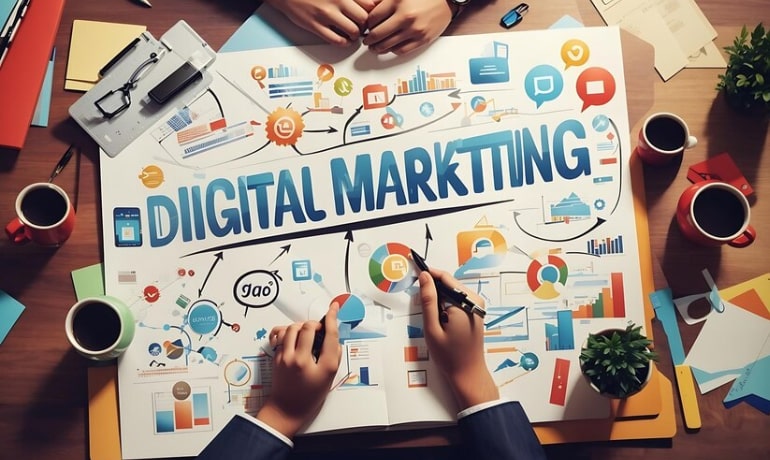A Comprehensive Guide
In the ever-evolving realm of digital marketing, staying ahead of the curve is not just a choice; it's a necessity. At the forefront of this evolution stands Artificial Intelligence (AI), a game-changing force that has redefined how businesses connect with their audiences. In this comprehensive guide, we explore the transformative impact of AI in digital marketing strategies, shedding light on its applications, evolution, and the profound changes it brings to the way we approach marketing in the digital age.
Understanding AI in Digital Marketing
Defining AI in Digital Marketing:
Artificial Intelligence, in the context of digital marketing, goes beyond buzzwords and headlines. It encompasses a spectrum of technologies, including machine learning, natural language processing, and predictive analytics. These technologies empower marketers to glean valuable insights from vast datasets, predict user behavior, and automate intricate marketing processes.
The Evolution of AI in Marketing:
The journey of AI in marketing is marked by significant milestones. From rudimentary applications in basic analytics to today's sophisticated predictive modeling, AI has become an indispensable tool for marketers. Early adopters witnessed the rise of chatbots, automated customer interactions, and personalized content recommendations, setting the stage for the AI-driven marketing landscape we navigate today.
AI-Powered Data Analytics
Predictive Analytics:
Predictive analytics, one of AI's most impactful applications, allows marketers to peer into the future. By analyzing historical data, AI algorithms discern patterns and make predictions, offering marketers the ability to proactively adjust strategies. This not only improves the precision of marketing campaigns but also enables businesses to anticipate market trends and consumer behaviors.
Customer Segmentation and Personalization:
AI enhances customer segmentation by parsing through intricate datasets to identify distinct customer groups. This, coupled with personalization algorithms, enables marketers to tailor campaigns with laser-like precision. By delivering content and offers based on individual preferences, businesses foster deeper connections with their audience.
AI in Content Creation and Curation
Automated Content Generation:
Gone are the days of manual content creation; AI now plays a pivotal role in generating high-quality, relevant content. Natural language processing algorithms can craft blog posts, social media updates, and product descriptions autonomously, freeing up marketers to focus on strategy and creativity.
Content Curation and Recommendation Engines:
AI-driven content curation involves the systematic analysis of vast information repositories to deliver the most relevant content to users. Recommendation engines, a staple of platforms like Netflix, leverage AI to understand user behavior and suggest personalized content. This not only enhances user engagement but also increases the likelihood of conversions.
AI in Content Creation and Curation
Automated Content Generation:
Gone are the days of manual content creation; AI now plays a pivotal role in generating high-quality, relevant content. Natural language processing algorithms can craft blog posts, social media updates, and product descriptions autonomously, freeing up marketers to focus on strategy and creativity.
Content Curation and Recommendation Engines:
AI-driven content curation involves the systematic analysis of vast information repositories to deliver the most relevant content to users. Recommendation engines, a staple of platforms like Netflix, leverage AI to understand user behavior and suggest personalized content. This not only enhances user engagement but also increases the likelihood of conversions.
AI-Driven Advertising and Campaign Management
Programmatic Advertising:
Programmatic advertising, fueled by AI, automates the ad buying process. AI algorithms analyze vast amounts of data in real-time to optimize ad placements, ensuring that each impression has the maximum impact. This efficiency translates into cost savings and improved campaign performance.
AI for Ad Targeting and Personalization:
AI refines ad targeting by analyzing user data to identify the most receptive audience segments. The result is highly targeted ad campaigns that resonate with the intended audience, leading to improved click-through rates and conversions.
Conclusion
In conclusion, the integration of AI into digital marketing strategies represents not just a trend but a paradigm shift. From data analytics to content creation and advertising, AI is a formidable ally for marketers seeking to navigate the complexities of the digital landscape. As businesses continue to adopt and adapt to these technologies, the synergy between human creativity and artificial intelligence promises a future where marketing is not just efficient but deeply impactful.
Embracing the power of AI is not a choice; it's a strategic imperative in a world where the only constant is change. As you embark on your AI-driven marketing journey, remember that the true magic happens when human ingenuity and artificial intelligence converge, creating a symphony of innovation that resonates with your audience in ways never before imagined.




Leave a Comment